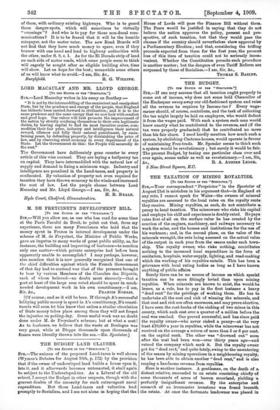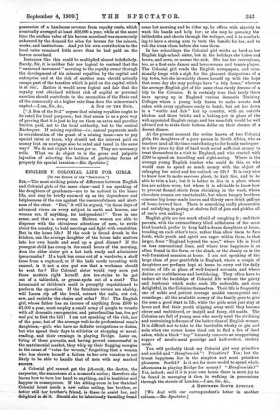THE TAXATION OF MINING ROYALTIES.
['TO THE EDITOR Or THE " SPECTATOR."] Sine—Your correspondent "Proprietor" in the Spectator of August 21st is mistaken in his argument that—in England at any rate, I cannot speak for Wales—the owners of mineral royalties are assessed to the local rates on the royalty rents, they receive. Mining royalties, as such, do not contribute -a. penny to local taxation. The mineowner who risks his capital' and employs his skill and experience is doubly rated. He pays. rates first of all on the surface value he has created by the erection of the engines, machinery, and railways necessary to work the mine, and the houses and institutions for the use of his workmen ; and, in the second place, on the value of the minerals wrought, the rate being assessed on the actual value of the output in each year from the seams under each town- ship. The royalty owner, who risks nothing, contributes nothing to the increased local expenditure in the form of sanitation, hospitals, water-supply, lighting, and road-making which the working of his royalties entails. This has been a grievance with local rating bodies as long as I have known anything of public affairs.
Surely there can be no source of income on which special taxation can be more fittingly levied than upon mining royalties. When minerals are known to exist, the would-be lessee, as a rule, has to pay in the first instance a heavy "dead rent" for the privilege of working them. He has to undertake all the cost and risk of winning the minerals, and that cost and risk are often enormous, and may prove abortive. I have seen the cost-books of the sinking of two mines in this county, which each cost over a quarter of a million before the coal was reached. One proved successful, and has since paid the royalty owner—who never risked a penny—at the very least £10,000 a year in royalties, while the mineowner has not received on the average a return of more than 5 or 6 per cent. on the capital sunk. The other was "drowned out" soon after the coal had been won—over thirty years ago—and ruined the company which sank it. But the royalty owner got his "dead rent," and quite lately, owing to the unwatering of the seams by mining operations in a neighbouring royalty, he has been able to obtain another "dead rent," and is also reaping a handsome revenue from royalties.
Here is another instance. A gentleman, on the death of a distant relative, succeeded to an estate consisting chiefly of some thousands of acres of barren moorland, yielding a perfectly insignificant revenue. By the enterprise and research of an ironmaster ironstone was found beneath the estate. At once the fortunate landowner was placed in possession of a handsome revenue from royalty rents, which eventually averaged at least 220,000 a year, while at the same time the sarfaee value of his barren moorland was enormously enhanced by the demand for sites for houses for the miners; works, and institutions. And Yet his own contribution to the local rates remained little more than he had paid on the barren moorland.
Instances like this could be multiplied almost indefinitely. Surely, Sir, it is neither fair nor logical to contend that the "unearned increment" accruing to the royalty owner through the development of his mineral royalties by the capital and enterprise and at the risk of another man should actually escape part of the taxation which is paid on the capital which is at ris's. Rather it would seem logical and fair that the royalty rent obtained without risk of capital or personal exertion should contribute to the necessities of the State and of the community at a higher rate than does the mineowner's [" A Son of the Soil" argues that Mining royalties ought to be rated for local purposes ; but that seems to us a poor way of proving that it is just to lay on them an extra and peculiar burden paid, not to the local authority, but to the central Exchequer. If mining royalties—i.e., annual payments made in consideration of the grant of a mining lease—are to pay special rates or taxes, why should not the interest paid on money lent on mortgage also be rated and taxed in the same way ? We do not object to taxes per se. They are necessary evils. What we do object to is the gross and palpable injustice of selecting the holders of particular forms of property for special taxation.—En. Spectator.] .







































 Previous page
Previous page